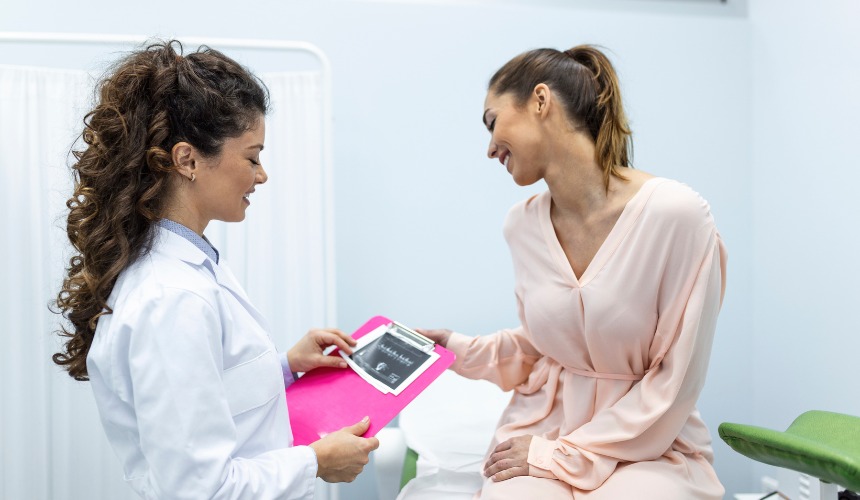Author: Dr. Sandhya Mishra MBBS, DNB, MS – Fellowship in ART
Consultant:Reproductive Medicine at Motherhood Hospital Indiranagar Bangalore
Ensuring the mother’s and baby’s health and well-being is paramount during pregnancy. To achieve this, antenatal screenings and tests are conducted at different stages of pregnancy. One such important screening is the anomaly scan, also known as fetal anomaly screening. This article will explore the significance of anomaly scans, their procedure, and the health concerns that can be detected through this screening. Understanding the importance of anomaly scans during pregnancy can help expectant parents make informed decisions and ensure the best possible outcomes for their baby’s health.
Understanding Anomaly Scan Procedure: What is it?
An anomaly scan is a detailed ultrasound examination typically performed between 18 to 22 weeks of pregnancy. This non-invasive procedure allows healthcare professionals to assess the baby’s development and growth and identify any potential abnormalities or birth defects. The scan provides valuable information about the baby’s organs, bones, limbs, and overall structure.
Importance of Early Detection of Birth Defects
One of the key objectives of the anomaly scan is the early detection of birth defects. Early identification allows parents and healthcare providers to plan for appropriate medical interventions and support. Detecting congenital disabilities early in pregnancy provides an opportunity for early interventions and consultations with specialists who can guide parents through the following steps.
Health Concerns Detected by Anomaly Scan
Anomaly scans can help identify various health concerns and abnormalities in the developing baby. Some of the health concerns that can be detected through an anomaly scan include:
- Neural Tube Defects: Anomaly scans can detect conditions such as spina bifida, where the neural tube, which develops into the baby’s brain and spinal cord, does not close properly.
- Heart Abnormalities: The scan can detect structural abnormalities in the baby’s heart, such as congenital heart defects, which can help plan appropriate medical care.
- Kidney and Urinary Tract Abnormalities: Anomaly scans can identify abnormalities in the baby’s kidneys or urinary tract, including conditions like kidney malformations or obstructions.
- Limb Abnormalities: The scan can detect abnormalities such as missing or shortened limbs or extra fingers or toes.
- Facial and Cranial Abnormalities: Anomaly scans can provide information about the baby’s facial and cranial structures, helping to identify conditions like cleft lip or palate or craniosynostosis.
he Procedure and Process
The anomaly scan is a safe and painless procedure that uses ultrasound technology. During the scan, a trained sonographer will apply a gel to the mother’s abdomen and use a handheld device called a transducer to create images of the baby in the womb. The sonographer will examine the images and measurements to assess the baby’s development and look for any signs of abnormalities.
While an anomaly scan can detect many health concerns, it is essential to note that it may not identify all possible abnormalities. In some cases, additional tests or consultations with specialists may be recommended for a more thorough assessment.
Conclusion
The anomaly scan is a crucial antenatal screening that is vital in assessing the baby’s health and identifying potential health concerns or congenital disabilities. This screening offers expectant parents valuable information about their baby’s development, enabling them to make informed decisions and seek appropriate medical care. By undergoing the anomaly scan, parents can take proactive steps to ensure the best possible health outcomes for their baby. Consult with your healthcare provider to understand the importance of anomaly scans during pregnancy and to schedule this critical screening as part of your comprehensive pregnancy health check-up.
Motherhood Hospitals has a team of experienced supers specialists backed by the latest infrastructure and facilities. We have the best gynaecologist in Indiranagar, Bangalore. We are experts in handling complex deliveries, gynaecological, and other surgeries, including various laparoscopic surgeries.
Do make an appointment with the best maternity hospital in Indiranagar, Bangalore at a centre closest to you. Meet with our doctors, who will carry out the required investigations, diagnose the issue and recommend the most appropriate treatment, enabling you to lead an active life.
If you wish to get in touch with Dr.Sandhya Mishra, please book your appointment here.
FAQs
- When should I schedule an anomaly scan during my pregnancy?
Anomaly scans are typically performed between 18 to 22 weeks of pregnancy. It is recommended to consult with your healthcare provider to determine the best timing for your specific pregnancy. - Is the anomaly scan safe for the mother and the baby?
The anomaly scan is considered safe for both the mother and baby. It uses ultrasound technology, which does not involve radiation and has been extensively used in prenatal care. - What should I expect during an anomaly scan?
During the anomaly scan, a gel will be applied to your abdomen, and a transducer will be used to create images of your baby. The sonographer will examine these images to assess your baby’s development and look for any signs of abnormalities. - Can an anomaly scan detect all possible birth defects or abnormalities?
While the anomaly scan is a comprehensive screening, it may not detect all possible abnormalities. However, it can identify many common health concerns and provide valuable information about your baby’s well-being. - What should I do if an anomaly is detected during the scan?
If an anomaly is detected during the scan, it is essential not to panic. Your healthcare provider will guide you through the following steps, which may include further tests or consultations with specialists to assess the situation more thoroughly. They will provide you with appropriate guidance and support throughout the process.


 Toll Free Number
Toll Free Number















